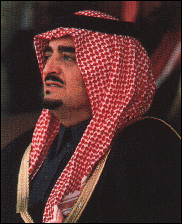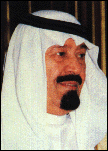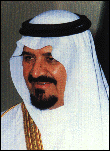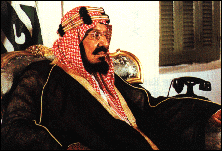
King Saud Bin Abdul Aziz 1953 - 1964
MODERN HISTORY
In the early 18th century, Sheikh Muhammad Bin Abdul Wahhab, the son of a religious judge, called on Muslims to return to the original form of Islam. Initially persecuted, he later found protection in the town of Diriyah, which was ruled by Muhammad Bin Saud, a member of the prominent Al-Saud family. The partnership between these two men eventually led to the foundation of Saudi Arabia.
By the early 1800s, the Al-Saud family ruled much of the Arabian Peninsula. This rise to power alarmed the Ottoman Empire, which sent forth its armies to contain the influence of the Al-Saud. The Ottomans ultimately captured Diriyah, thus ending the first phase of the Al-Saud reign in 1818.
By 1824, the Al-Saud regained political control of central Arabia and once again ruled the region from their new capital of Riyadh, located close to Diriyah. A period of unrest and tribal warfare began in 1865 and resulted in the Al-Rashid family, with Ottoman support, extending its power over the Saudi state. The Al-Saud, under the leadership of Abdul Rahman, were forced into exile in 1891. They lived on the borders of the Empty Quarter before settling in Kuwait.
Twenty-one-year-old Abdul Aziz Bin Abdul Rahman Al-Saud left Kuwait in 1901, determined to recapture all of the territory once held by his forefathers and to extend his protection over the holy cities of Makkah and Madinah. In a daring battle he recaptured Riyadh in 1902. This event marks the beginning of the formation of the modern state of Saudi Arabia. After establishing Riyadh as his headquarters, Abdul Aziz proceeded, over the following decades, to unite the different regions into one nation.
On September 23, 1932, the country was named the Kingdom of Saudi Arabia as an Islamic state, with Arabic designated as the national language and the Holy Qur'an as its constitution.
The stability and prosperity that has reigned in Saudi Arabia for more than 60 years are due in large part to the legacy of its legendary founder. King Abdul Aziz was a remarkable leader of imagination and vision who launched Saudi Arabia on the road to taking its rightful place on the world stage. Although he never left the Arab world, he astounded visitors with his shrewd mastery of world affairs and proved to be a highly-sophisticated statesman. Self-disciplined and moderate. intelligent and courageous, his considerable abilities were reinforced by his deep devotion to God.

King Saud Bin Abdul Aziz 1953 - 1964
During his rule, King Abdul Aziz laid the foundations for the modernization of his country. He began to build the country's infrastructure, first establishing roads and basic communications systems and later introducing modern technology and improving education, health care and agriculture.
Saud, the eldest son of Abdul Aziz, acceded to the throne upon his father's death in 1953. He instituted the Council of Ministers and established the Ministries of Health, Education and Commerce. A large number of schools and the Kingdom's first institute of higher education, King Saud University, were opened in Riyadh in 1957. King Saud made the first trip by a Saudi monarch to the United States in 1957. In 1962, Saudi Arabia sponsored an international Islamic conference, which fostered the World Muslim League, headquartered in Makkah.

King Faisal Bin Abdul Aziz 1964 - 1975
Faisal Bin Abdul Aziz became king in 1964. King Faisal's governance at home was marked by a respect for tradition combined with innovation. While his father had shaped the Kingdom, Faisal built and consolidated the country. His vast experience in foreign affairs starting at an early age allowed him to devote great effort to this area during his reign. To deepen links between Islamic nations, he traveled widely throughout the Arab and Islamic worlds. He took firm control of the country's fiscal policy and in 1970 initiated the first of the highly successful five-year Development Plans that have resulted in Saudi Arabia's rapid development. King Faisal was a central force behind the establishment of the Organization of the Islamic Conference in Jeddah in 1971, which is composed of Islamic countries and is dedicated to promoting Islamic unity and cooperation. King Faisal was named Time magazine's "Man of the Year" in 1975 and was one of the world's most-respected leaders, as well as one of its most powerful men.

King Khalid Bin Abdul Aziz 1975 - 1982
King Khalid Bin Abdul Aziz succeeded King Faisal in 1975. Under his leadership, Saudi Arabia continued its development at a remarkable pace. King Khalid launched the Kingdom's monumental Second and Third Development Plans in 1975 and 1980, under which the country's major infrastructure was established. The standard of living increased substantially and the Kingdom achieved political and economic prominence both regionally and internationally. Under King Khalid's leadership, the Gulf Cooperation Council (GCC) was formed in 1981. The GCC links Saudi Arabia with neighboring Bahrain, Kuwait, Oman, Qatar and the United Arab Emirates for economic and security cooperation and coordination.

King Fahd Bin Abdul Aziz Al-Saud
The Kingdom's current leader, King Fahd Bin Abdul Aziz, succeeded King Khalid in 1982. He has directed Saudi Arabia's continued development and the diversification of its economic base away from reliance on oil. During his rule, the Kingdom's private sector has grown rapidly, now accounting for more than a third of the country's gross domestic product (GDP).
King Fahd began his distinguished career in public service more than half a century ago. As a young man, he represented Saudi Arabia at international events. His first high-level government post was Minister of Education during King Saud's reign. As the Kingdom's first Minister of Education, he helped plan and implement a far-ranging program to improve the quality of education and make it available to all Saudi citizens. In 1962 then-Prince Fahd became Minister of the Interior and, in 1967, Second Deputy Prime Minister. Prince Fahd was invested as Crown Prince and First Deputy Prime Minister in 1975. Thus, he was an active participant in Saudi Arabia's progress and growth that began in earnest with the introduction of the first five-year Development Plan in 1970. Among Crown Prince Fahd's many achievements in the realm of foreign affairs was his 1981 proposal to resolve the Arab-lsraeli conflict known as the Fahd Plan and adopted by the League of Arab States as the Fez Initiative.
When he became King, Fahd was already known as an experienced leader. He has focused his efforts on building enduring prosperity in Saudi Arabia through Development Plans that stress planning, broad educational opportunities, a diversified economy and resource conservation.
On the domestic scene, King Fahd has introduced extensive reforms aimed at facilitating the continued development of Saudi Arabia in all spheres. In an effort to enhance the administrative efficiency and further development of the nation, King Fahd in 1992 announced new bylaws for the Basic System of Government, Majlis Al-Shoura (Consultative Council) and the Provincial Council System. In 1993, he introduced bylaws for the Council of Ministers. On December 29, 1993, King Fahd opened the first meeting of the new Majlis Al-Shourah, a body of 60 highly-qualified Saudi citizens with specializations in all fields, which makes recommendations and gives advice to the king on various issues. Though the concept of Shoura (consultation) has always been practiced by Saudi leaders, the new system gives it a more formalized structure to better assist in meeting the requirements of the modern state. King Fahd also decreed new bylaws for the Higher Education Council and University System. These bylaws will enable the nation's higher education system to better meet the country's growing need for educated and skilled citizens in larger numbers and newer fields as the Kingdom approaches the 21st century.
As the Custodian of the Two Holy Mosques of Makkah and Madinah, King Fahd continued the policy of previous Saudi leaders to expand the facilities at the holy sites and across the Kingdom to facilitate the annual pilgrimage for a greater number of Muslims from around the world. Today, more than two million pilgrims take part in the annual Hajj. In 1992, a project personally launched and overseen by King Fahd was completed, expanding the capacity of the Holy Mosque to accommodate more than one million worshipers and that of the Prophet's Mosque to more than half a million worshipers.
In the international arena, King Fahd has helped to achieve reconciliation among Arab as well as other Islamic nations, particularly through the League of Arab nations, the Organization of the Islamic Conference and other international forums. During the Arabian Gulf Crisis, he played a decisive role in restoring international legitimacy and implementing United Nations Security Council resolutions. King Fahd was also instrumental in putting together a coalition of Arab, Islamic and other friendly states that ultimately secured Kuwait's liberation. King Fahd has also played an active role in seeking peaceful resolutions for crises in Bosnia-Herzegovina, Lebanon, Afghanistan, Somalia and other parts of the world. Under his direction, Saudi Arabia has provided emergency assistance to numerous countries suffering from natural disasters.
Among King Fahd's many international achievements is the historic Taif Accord. After years of quiet, behind-the-scenes diplomacy, Lebanese parliamentarians met in Taif, Saudi Arabia, in 1989 and established a national reconciliation government to end 15 years of civil war and return normalcy to their country. King Fahd has also been an active supporter of Lebanon's reconstruction efforts, providing financial aid and other forms of assistance. An advocate of peace, he has supported the Middle East peace process, including the declaration of principles between the Palestine Liberation Organization and Israel in Washington on September 13, 1993, as a first step towards achieving a just and comprehensive settlement of the Arab-Israeli conflict.

Deputy Prime Minister and Commander of the National Guard Crown Prince Abdullah Bin
Abdul Aziz.

Second Deputy Prime Minister and Minister of Defense and Aviation Prince Sultan Bin
Abdul Aziz.
Abdullah Bin Abdul Aziz became Crown Prince and Deputy Prime Minister in 1982, and has been Commander of the National Guard since 1962. Crown Prince Abdullah has participated in shaping the Kingdom's Development Plans and plays an active role in governing the country. He has contributed to consolidating the Kingdom's position as a moderator and arbitrator in regional politics.
Prince Sultan Bin Abdul Aziz has been Second Deputy Prime Minister since 1982 and Minister of Defense and Aviation since 1962. He has helped to build and modernize the Kingdom's armed forces and has also contributed to the development of the national airline, Saudia, into a world-class carrier. Prince Sultan has also been an active participant in the development and administrative affairs of the Kingdom.

King Abdul Aziz Bin Abdul Rahman Al -Saud founded the modern Kingdom of Saudi Arabia in
1932.